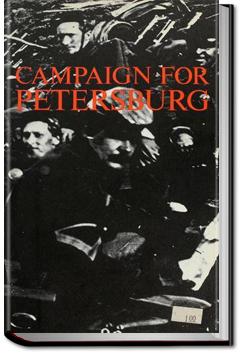UNLIMITED Audiobooks and eBooks
Over 40,000 books & works on all major devices
Get ALL YOU CAN for FREE for 30 days!
Campaign For Petersburg
Richard Wayne Lykes
Book Overview:
In the American Civil War the Union victory in the ten-month campaign for the city of Petersburg, Virginia (June 1864-March 1865), led directly to the surrender of the Confederacy within two weeks. This 1970 National Park Service booklet tells the story of the campaign. It focuses on the meaning of the campaign and the experience of the soldiers of both sides, with a minimum of references to military units.
In the American Civil War the Union victory in the ten-month campaign for the city of Petersburg, Virginia (June 1864-March 1865), led directly to the surrender of the Confederacy within two weeks. This 1970 National Park Service booklet tells the story of the campaign. It focuses on the meaning of the campaign and the experience of the soldiers of both sides, with a minimum of references to military units.
How does All You Can Books work?
All You Can Books gives you UNLIMITED access to over 40,000 Audiobooks, eBooks, and Foreign Language courses. Download as many audiobooks, ebooks, language audio courses, and language e-workbooks as you want during the FREE trial and it's all yours to keep even if you cancel during the FREE trial. The service works on any major device including computers, smartphones, music players, e-readers, and tablets. You can try the service for FREE for 30 days then it's just $19.99 per month after that. So for the price everyone else charges for just 1 book, we offer you UNLIMITED audio books, e-books and language courses to download and enjoy as you please. No restrictions.
From the Rapidan River to the James, Lt. Gen. Ulysses S. Grant (above), commanding the armies of the United States, found all his efforts to capture Richmond and destroy the Confederacy blocked by Gen. Robert E. Lee (below) and his Army of Northern Virginia. Finally, Grant turned his attention to Petersburg.
4 Union Movements Confederate Movements Major Battles and Engagements WILDERNESS MAY 5-7, 1864 SPOTSYLVANIA MAY 8-19, 1864 COLD HARBOR JUNE 3-13, 1864 PETERSBURG CAMPAIGN JUNE 1864-APRIL 1865 FIVE FORKS APRIL 1, 1865 SAYLER’S CREEK APRIL 6, 1865Such a man was found in Maj. Gen. Ulysses S. Grant, the victor at Vicksburg and Missionary Ridge, who was brought east and, on March 9, 1864, commissioned lieutenant general to be responsible for all the Union armies. Unlike his predecessor, Henry W. Halleck, Grant decided not to remain in Washington but chose instead to accompany the Army of the Potomac, wher. . . Read More
Try now for FREE!

"Love your service - thanks so much for what you do!"
- Customer Cathryn Mazer
"I did not realize that you would have so many audio books I would enjoy"
- Customer Sharon Morrison
"For all my fellow Audio Book & E-Book regulars:
This is about as close to nirvana as I have found!"
- Twitter post from @bobbyekat


